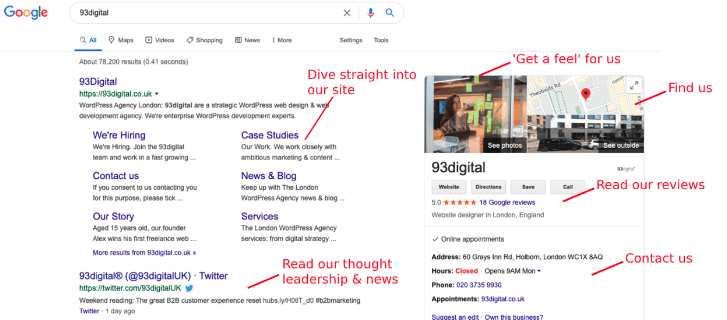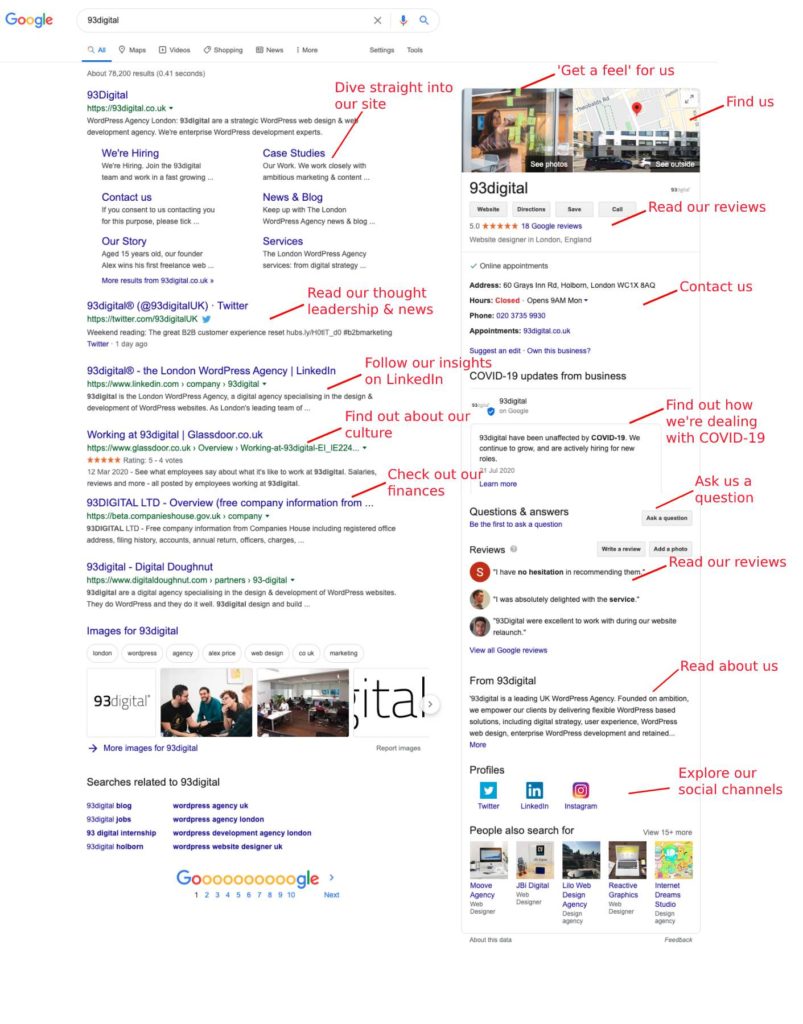The homepage: the least important page on your website?

OK, before anyone accuses me of using a clickbait title – yes, I might be playing devil’s advocate a little here.
Of course, the homepage of your website is still important.
But let me explain why for lots of our clients, and for even more looking ahead, the importance of the ‘homepage’ as we know it could be gradually declining, or at least have some competition.
Is your new homepage Google’s SERP?
The idea that the Google SERPs (Search Engine Results Pages) are the new ‘homepage’ has been around for a while now. The concept first came about for small ‘local’ businesses, but really is relevant for all businesses now to some degree.
Take a look at the search results page below for anyone that Google’s ’93digital’:

Sitelinks under our homepage allow users to dive straight into specific pages on our site such as case studies or our contact page. Potential clients can read reviews from past clients. Future employees can find out about our culture on GlassDoor. The visual 5 gold stars under on our GlassDoor page and our Google Reviews provide powerful social proof. The photos we have uploaded give our agency a human face.
You get the idea – lots of what our audience might need to know about us at a certain point in their buyer journey is available without even coming to our website.
And if and when they do come to our site, they’re probably looking for more. More detail. More depth. More relevant content. Think case studies, resources, white papers, detail on our processes and so on. They’ve potentially done their early stage research and top level ‘qualification’ just from Google alone.
Considering your buyer journey
Within B2B, the customer journey can be lengthy, considered and complex. The decision making unit of a business looking to engage us for a website project might consist of 5-10 roles spanning marketing, procurement, IT, finance and other C-Suite project sponsors. The journey can take months from first interaction through to signed off Statement of Work, with different personas having differing priorities and looking for different information from us along the journey.
The marketers we engage with want to know about how we’ll help them deliver marketing results. The IT teams we engage with want to know how we approach security and DevOps. Different roles, different challenges, different objectives, and therefore different journeys.
So it’s not as simple as claiming that a homepage is not important – the reality is much more nuanced, and depends on the stage of the buyer journey. The example I’ve used so far assumes a direct branded search term such as our company name being used.
For example: imagine we take part in a pitch, we get shortlisted as the favourite agency and as a last step the VP Marketing sends our website URL to the CEO recommending that they go with us but seeking his or her final approval. The CEO gets the email, clicks on 93digital.co.uk and checks us out by scrolling through our homepage. Now obviously at this point, our homepage is key. This one visit to our homepage, from this one persona, could be the make or break. The decider between £0 or hundreds of thousands of £ of future revenue for us.
Preparing for the future
Whichever way we look at it, the reality is that Google is likely to keep extending and expanding the amount of information it surfaces on the SERPs. So optimising with this in mind, along with the concept of ‘owning the SERPs’, should be one that every business is thinking about.
If you search for 93digital on Google, and then click through the search engine results pages, you will see we ‘own’ nearly every result. For at least 4 or 5 pages of results, more or less every result you see will be a ‘profile’ listing of some kind that we control and can edit/update, or a piece of positive content/PR that we have placed. This is no accident.
In addition, the data found on websites is gradually becoming more structured, and Google continues to provide us as web developers more tools to structure our data for Google to understand it. We’re effectively making it easier for Google to surface our data on the SERPs which is in our interest for lots of reasons, but it also means that certain websites in some niches could gradually see website traffic falling. If users can get everything they need from Google’s results page, why do they need to click through to your site? There’s some interesting insights on this from Ahrefs here and Search Engine Journal here.
Google provides all businesses with tools and frameworks to manage how they appear on the Google results page, and how content appears in the SERPs. These include Search Console, My Business and the application of schema.com markup or Structured Data. I recommend ensuring you’re taking advantage of all of these tools, and thinking strategically about optimising and owning the SERPs.

ACF Blocks: A happy Gutenberg medium?

Meet the team: Jodi
Let's Talk
Do you have a web design and build project coming up that you would like to talk about?